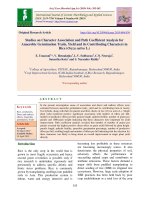Character association and path co-efficient analysis for yield attributing traits in dahlia (Dahlia variabilis L.)
Bạn đang xem bản rút gọn của tài liệu. Xem và tải ngay bản đầy đủ của tài liệu tại đây (280.85 KB, 7 trang )
Int.J.Curr.Microbiol.App.Sci (2020) 9(8): 2944-2950
International Journal of Current Microbiology and Applied Sciences
ISSN: 2319-7706 Volume 9 Number 8 (2020)
Journal homepage:
Original Research Article
/>
Character Association and Path Co-efficient Analysis for Yield Attributing
Traits in Dahlia (Dahlia variabilis L.)
Maguluri Sree Devi*, G. K. Seetharamu, B. C. Patil, C. N. Hanchinamani,
Laxman Kukanoor, D. Satish and Sandhyarani Nishani
Kittur Rani Channamma College of Horticulture, Arabhavi, University of Horticultural
Sciences, Bagalkot, Karnataka, India
*Corresponding author
ABSTRACT
Keywords
Dahlia,
Correlation, Path
analysis, Selection
Article Info
Accepted:
24 July 2020
Available Online:
10 August 2020
An experiment was conducted with 32 cultivars of dahlia (Dahlia variabilis L.) to study
correlation and path analysis among the yield attributing traits and their effect. Correlation
among component characters showed that flower yield per plant had a highly significant
positive genotypic correlation with leaf area index (0.617), crop duration (0.771),
flowering duration (0.800), tuber weight (0.668) and change in fresh weight at day 3. Pathcoefficient analysis revealed a positive direct effect of duration of crop, duration of
flowering, flower diameter, vase life, total chlorophyll content and change in fresh weight
at day 3 on flower yield per plant proving that direct selection of these traits can be
implemented for yield improvement. Hence the parameters selected in the study are
sufficient for direct selection of cultivars for cut flower attributing traits in dahlia.
Introduction
Dahlia (Dahlia variabilis L.) is a tuberous
rooted herbaceous perennial belonging to the
family Asteraceae having its origin in
Mexico. It is popular plant for landscaping,
cut flower and loose flower purposes (Smith,
1971).Knowledge on inter-relationship of
characteristics of crop is of paramount
importance as it helps in selecting appropriate
components, which would result with
improvement of complex characteristics that
are correlated with each other (Al-Jibourie et
al., 1958). However, ccorrelation coefficient
alone
cannot
provide
a
complete
representation of the causal basis of
relationship and path coefficient analysis is
relied upon to do so (Islam and Khan, 1991
and McGiffen et al., 1994). Therefore, the
present investigation was undertaken to
estimate associations among desired traits and
their direct and indirect contributions toward
yield in thirty two cultivars of dahlia.
Materials and Methods
The experiment was carried out at department
of Floriculture and Landscape Architecture,
Kittur Rani Channamma College of
Horticulture, Arabhavi which is situated in the
2944
Int.J.Curr.Microbiol.App.Sci (2020) 9(8): 2944-2950
Northern dry zone (Zone III) of Karnataka.
The experiment was laid out in Randomized
Block Design with spacing of 60 cm 40 cm,
which was replicated twice with 32 genotypes
in open field condition. Treatments details of
cultivars used are enlisted in Table
1.Recommended agro techniques were
followed and observations were made on the
different vegetative and floral parameters.
Genotypic and phenotypic correlation
coefficients were calculated according to the
formula suggested by Johnson et al., (1955)
and Hanson et al., (1956). Correlation
coefficient were further partitioned into
components of direct and indirect effects by
path coefficient analysis originally developed
by Wright (1921) and later described by
Dewey and Lu (1959).
Results and Discussion
Yield is a complex trait determined by several
other parameters. Hence, the association of
these characters with yield and among
themselves is of paramount factor in selection
of best genotypes. It is evident from Table 2
that, flower yield per plant had a highly
significant positive genotypic correlation with
leaf area index (0.617), crop duration (0.771),
flowering duration (0.800), tuber weight
(0.668) and change in fresh weight at day 3
(0.347), while non-significant negative
correlation was observed between flower
yield per plant and plant height at 90 DAP (0.021). A positive non-significant association
with flower yield per plant was observed for
all the other traits. A highly significant
positive phenotypic correlation was observed
between flower yield per plant and leaf area
index (0.592), duration of crop (0.686) and
duration of flowering (0.778), while tuber
weight (0.646) showed a significant positive
correlation. All other traits except plant height
at 90 DAP showed a non-significant positive
correlation (Table 2). These observations
regarding vase life were in parallel with
studies done by Mathad et al., (2005) in
marigold; Kumari et al., (2017) in
chrysanthemum. The degree of association
between characters as indicated by the
correlation coefficients has always been a
helpful instrument for the selection of
desirable characters under a breeding program
(Islam et al., 2010).
According to Table3, at genotypic level,
duration of crop (5.848), duration of
flowering (2.663) and flower diameter (2.506)
had a very high direct positive effect on
flower yield per plant while vase length
(0.770), total chlorophyll content (0.595) and
change in fresh weight at day 3 (0.419) had a
high direct positive effect. Plant height at 90
DAP showed a negligible positive effect
whereas,
water
uptake
at
day 3
(-2.390), plant spread in E-W (-1.664), stalk
length (-1.593), tuber weight (-1.508) and
LAI (-0.373) showed a direct negative. plant
height at 90 DAP had a non-significant
negative correlation with flower yield per
plant (-0.021) due to indirect negative effect
via water uptake at day 3 (-1.475), plant
spread in E-W (-1.210), stalk length (-1.119),
total chlorophyll content (-0.204) and
duration of flowering (-0.003) whereas,
flower diameter (2.095), duration of crop
(1.309), vase life (0.376), change in fresh
weight at day 3 (0.081), LAI (0.045) and
tuber weight (0.029) had an indirect positive
effect. duration of crop had a positive and
highly significant correlation with flower
yield per plant (0.771) via the indirect
positive effect of flower diameter (0.659),
vase life (0.353), change in fresh weight at
day 3 (0.122), plant height at 90 DAP (0.012)
and total chlorophyll content (0.0100.),
duration of flowering had a highly significant
positive correlation with flower yield per
plant (0.800) which was due to the indirect
positive effect of duration of crop (5.350),
flower diameter (0.296), vase life (0.289),
change in fresh weight at day 3 (0.138), total
2945
Int.J.Curr.Microbiol.App.Sci (2020) 9(8): 2944-2950
chlorophyll content (0.061)and plant height at
90 DAP (0.0001)Parallel findings were
reported by Raghupathi et al., (2019) and
Basavaraj (2006) in dahlia; Magar et al.,
(2010) in gerbera. Hence, direct selection of
duration of crop, duration of flowering,
flower diameter, vase life, total chlorophyll
content and change in fresh weight at day 3 is
appropriate for yield improvement.
Table.1 Details of the dahlia genotypes used in present study
Sl. No.
1
2
3
4
5
6
7
8
9
10
11
12
13
14
15
16
17
18
19
20
21
22
23
24
25
26
27
28
29
30
31
32
Genotype
Krishna
Barakachri
Binayananda
Good Day
Glory of India
M Trangini
Gargi
Master Pic
Hiranmayi
Satya Samrat
Silpa
Santashima
Sachin
Pagaltahaker
Eternity
Buddha’s Mother
Santi
Jayal Singh
Nilkamal
Salini
Pusona
Jisu
Sowmitha
Kaviguru
WOK
Sourav
Guddy
OK
YBK
YK
WBK
WK
Plant stature
Tall
Tall
Tall
Tall
Tall
Tall
Tall
Tall
Tall
Tall
Tall
Tall
Tall
Tall
Tall
Tall
Tall
Tall
Tall
Medium
Medium
Medium
Medium
Medium
Medium
Medium
Dwarf
Dwarf
Dwarf
Dwarf
Dwarf
Dwarf
2946
Flower colour and scheme
Light blend (Pink and light yellow)
Monochromatic (Yellow)
Light blend (orange)
Monochromatic (Pink)
Monochromatic (Pink)
Light blend (Tan)
Monochromatic (White)
Monochromatic (Red)
Bicolour (Red and white)
Monochromatic (Orange)
Monochromatic (Red)
Light Blend (Red and white)
Monochromatic (White)
Monochromatic (White)
Monochromatic (Yellow)
Bicolour (Red and white)
Monochromatic (Orange)
Monochromatic (Red)
Light blend (White and red)
Monochromatic (Yellow)
Monochromatic (Pink)
Light Blend (White and maroon)
Light Blend (White and orange)
Monochromatic (Red)
Monochromatic (Pink)
Monochromatic (Orange)
Monochromatic (Yellow)
Monochromatic (Orange)
Light Blend (Orange and yellow)
Light Blend (White and orange)
Monochromatic (Orange)
Monochromatic (Orange)
Int.J.Curr.Microbiol.App.Sci (2020) 9(8): 2944-2950
Table.2 Genotypic and phenotypic correlation co-efficient for growth, flowering, quality and yield parameters in dahlia genotypes
LAI
PS
DC
DF
TW
FD
SL
VL
WU3
CF3
CHL
FPP
PH
1
-0.121
0.727**
0.223
0.223*
-0.019
0.836**
0.702**
0.488**
0.638**
0.194
-0.342**
-0.021
LAI
-0.121
1
-0.058
0.632**
0.632**
0.635**
0.113
0.149
0.314*
0.247*
0.397**
-0.168
0.617**
PS
0.654**
-0.061
1
0.459**
0.426**
0.154
0.689**
0.624**
0.326**
0.498**
-0.046
-0.015
0.216
DC
0.206
0.585**
0.337**
1
0.914**
0.807**
0.263*
0.344**
0.459**
0.498**
0.291*
0.016
0.771**
DF
0.206
0.585**
0.337**
0.835**
1
0.832**
0.118
0.076
0.375**
0.290*
0.329**
0.103
0.800**
TW
-0.01
0.609**
0.141
0.692**
0.798**
1
0.09
0.250*
0.235*
0.188
0.414**
0.228
0.668**
FD
0.746**
0.102
0.575**
0.1987
0.113
0.075
1
0.722**
0.677**
0.716**
0.320**
-0.300*
0.139
SL
0.667**
0.146
0.548**
0.315*
0.063
0.225
0.623**
1
0.419
0.471**
0.244
0.002
0.042
VL
0.483**
0.303*
0.326**
0.409**
0.371**
0.221
0.600**
0.406**
1
0.910**
0.393**
-0.348**
0.237
WU3
0.632**
0.245
0.456**
0.462**
0.286*
0.185
0.655**
0.448**
0.898**
1
0.322**
-0.509**
0.173
CF3
0.182
0.381**
-0.042
0.273*
0.310*
0.361**
0.287*
0.223
0.375**
0.31
1
-0.181
0.347**
CHL
-0.331**
-0.167
-0.011
0.007
0.098
0.218
-0.262*
0.01
-0.338** -0.498**
-0.184
1
0.213
FPP
-0.018
0.592**
0.165
0.686**
0.778**
0.646**
0.103
0.015
0.310*
0.198
1
0.219
0.170
PCC= Phenotypic correlation coefficient
(PH-Plant height at 90 DAP (cm), LAI-Leaf Area Index, PS-Plant spread in E-W (cm), DC-Duration of crop (days), DF-Duration of flowering (days), TW-Tuber weight (g)
FD-Flower diameter (cm), SL-Stalk length (cm), VL-Vase life days, WU3-Water uptake at day 3 (ml), CF3-Change in fresh weight at day 3 (%), CHL-Total chlorophyll
content, FPP-Number of flowers per plant
* Significant at P = 0.05 ** Significant at P = 0.01 r value at 5% = 0.246 and 1% = 0.319
2947
GCC= Genotypic correlation coefficient
PH
Int.J.Curr.Microbiol.App.Sci (2020) 9(8): 2944-2950
Table.3 Estimates of genotypic and phenotypic path coefficient analysis for growth, flowering, quality and yield parameters in dahlia
PH
LAI
PS
DC
DF
TW
FD
SL
VL
WU3
CF3
CHL
FPP
PH
0.054
0.045
-1.210
1.309
-0.003
0.029
2.095
-1.119
0.376
-1.475
0.081
-0.204
-0.021
LAI
-0.006
-0.373
0.097
3.699
-1.700
-0.958
0.283
-0.237
0.241
-0.493
0.166
-0.099
0.618**
PS
0.039
0.021
-1.664
2.684
-0.581
-0.232
1.727
-0.995
0.251
-1.006
-0.019
-0.009
0.216
DC
0.012
-0.236
-0.763
5.848
-2.436
-1.218
0.659
-0.547
0.353
-1.032
0.122
0.010
0.771**
PH
LAI
PS
DC
DF
TW
FD
SL
VL
WU3
CF3
CHL
FPP
PH
0.261
-0.049
0.052
0.054
0.0005
0.0006
0.082
-0.277
-0.027
-0.021
0.023
-0.117
-0.018
LAI
-0.031
0.405
-0.004
0.154
0.191
-0.036
0.011
-0.06
-0.017
-0.007
0.047
-0.059
0.592**
PS
0.171
-0.024
0.08
0.088
0.064
-0.008
0.063
-0.227
-0.018
-0.013
-0.005
-0.004
0.165
DC
0.054
0.237
0.027
0.263
0.255
-0.041
0.021
-0.13
-0.023
-0.013
0.034
0.002
0.686**
Genotypic path coefficient analysis
DF
TW
FD
0.000
-0.001
0.045
-0.238
-0.237
-0.042
-0.363
-0.256
-1.147
5.350
4.722
1.539
-2.215
-0.315
2.663
-1.255
-0.136
-1.508
0.296
0.226
2.506
-0.121
-0.399
-1.151
0.289
0.181
0.521
-0.693
-0.152
-1.635
0.138
0.173
0.134
0.061
0.136
-0.179
0.800**
0.668**
0.139
Phenotypic path coefficient analysis
DF
TW
FD
0.0005
-0.002
0.195
0.253
0.247
0.041
0.016
0.011
0.046
0.22
0.182
0.052
0.244
0.034
0.305
-0.048
-0.004
-0.06
0.012
0.008
0.109
-0.026
-0.093
-0.258
-0.021
-0.012
-0.034
-0.01
-0.002
-0.021
0.039
0.045
0.036
0.035
0.077
-0.093
0.778**
0.646**
0.103
SL
0.038
-0.055
-1.038
2.009
-0.202
-0.377
1.809
-1.593
0.322
-0.972
0.102
0.001
0.042
VL
0.026
-0.117
-0.543
2.686
-0.999
-0.355
1.696
-0.667
0.770
-2.216
0.164
-0.207
0.237
WU3
0.033
-0.077
-0.700
2.526
-0.772
-0.096
1.715
-0.648
0.714
-2.390
0.144
-0.291
0.157
CF3
0.010
-0.148
0.076
1.705
-0.876
-0.625
0.802
-0.388
0.303
-0.823
0.419
-0.108
0.347*
CHL
-0.018
0.062
0.027
0.097
-0.274
-0.344
-0.754
-0.004
-0.268
1.170
-0.076
0.595
0.213
SL
0.174
0.059
0.044
0.083
0.019
-0.013
0.068
-0.414
-0.023
-0.013
0.028
0.003
0.015
VL
0.126
0.122
0.026
0.107
0.113
-0.013
0.066
-0.168
-0.057
-0.031
0.047
-0.12
0.219
WU3
0.159
0.083
0.031
0.104
0.087
-0.003
0.068
-0.162
-0.052
-0.034
0.041
-0.17
0.152
CF3
0.047
0.154
-0.003
0.072
0.095
-0.021
0.031
-0.092
-0.021
-0.011
0.125
-0.065
0.310*
CHL
-0.086
-0.067
-0.001
0.001
0.03
-0.013
-0.028
-0.004
0.019
0.016
-0.023
0.355
0.198
(PH-Plant height at 90 DAP (cm), LAI-Leaf Area Index, PS-Plant spread in E-W (cm), DC-Duration of crop (days), DF-Duration of flowering (days), TW-Tuber weight (g)
FD-Flower diameter (cm), SL-Stalk length (cm), VL-Vase life days, WU3-Water uptake at day 3 (ml), CF3-Change in fresh weight at day 3 (%), CHL-Total chlorophyll
content, FPP-Number of flowers per plant.
* Significant at P = 0.05 ** Significant at P = 0.01 r value at 5% = 0.246 and 1% = 0.319 Residual effect = 0.195 Bold: Direct effect Above and below diagonal: indirect effect
2948
Int.J.Curr.Microbiol.App.Sci (2020) 9(8): 2944-2950
At phenotypic level, high direct positive
effect was exhibited by LAI (0.405), total
chlorophyll content (0.355) and duration of
flowering (0.305) while moderate direct
positive effect was exhibited by duration of
crop (0.263) and plant height at 90 DAP
(0.2610).Change in fresh weight at day 3
(0.125) and flower diameter (0.109) showed a
low direct positive effect while negative
effect was exhibited by stalk length (-0.414),
tuber weight (-0.060), vase life (-0.057) and
water uptake at day 3 (-0.034).Plant height at
90 DAP had a non-significant negative
correlation with flower yield per plant (0.018) due to negative and indirect effect of
stalk length (-0.277), total chlorophyll content
(-0.117), LAI (-0.049), vase life (-0.027) and
water uptake at day 3 (-0.021) while there was
also an indirect positive effect of flower
diameter (0.082), duration of crop (0.054),
plant spread in E-W (0.052), change in fresh
weight at day 3 (0.023), tuber weight (0.0006)
and duration of flowering (0.0005). Duration
of crop showed a highly significant positive
correlation with flower yield per plant (0.686)
via the indirect positive effect of duration of
flowering (0.255), LAI (0.237), plant height
at 90 DAP (0.054), change in fresh weight at
day 3 (0.034), plant spread in E-W (0.027),
flower diameter (0.021) and total chlorophyll
content (0.002) while there was an indirect
negative effect via stalk length (-0.130), tuber
weight (-0.041), vase life (-0.023) and water
uptake at day 3 (-0.013).
Similar reports were confirmed by
Karuppaiah and Kumar (2010), Bharati et al.,
(2014), Panwar et al., (2014), Anuja and
Jahnavi (2012) in marigold; Kumari et al.,
(2017) in China aster; Deka and Paswan
(2014) in chrysanthemum. Hence, direct
selection of duration of crop, duration of
flowering, flower diameter, vase life, total
chlorophyll content and change in fresh
weight at day 3 is appropriate for yield
improvement.
In conclusion, since more emphasis must be
given to restricted selection based on positive
direct effects rather than indirect effects,
direct selection of duration of crop, duration
of flowering and flower diameteris
appropriate for simultaneous progression of
more than one trait, especially in a complex
character like yield which influenced by many
other traits. Direct selection of traits that had
high direct positive effect is appropriate for
yield improvement. The residual effects
appeared to be considerably low (0.195)
which indicated that the characters included
in this study explained almost all variability
towards yield.
References
Al-Jibourie, H. A., Miller, P.A., Robinson,
H.V.,
1958,
Genotypic
and
Environmental variance and covariances in a upland cotton cross of
interspecific origin. Agron. J., 50: 633536.
Anuja, S. and Jahnavi, K., 2012, Variability,
heritability and genetic advance studies
in French marigold (Tagetes patula L.).
Asian J. Hort., 7(2): 362-364.
Basavaraj, 2006, Genetic variability studies in
dahlia. M.Sc. (Hort).Thesis, Univ. Agric.
Sci., Dharwad.
Bharati, T. U., Jawaharlal, M., Kannan, M.,
Manivannan, N. and Raveendran, M.,
2014, Correlation and path analysis in
African marigold (Tagetes erecta L.).
The Bioscan, 9(4): 1673-1676.
Deka, K. K. and Paswan, L., 2014, Correlation
and
path
analysis
studies
in
chrysanthemum. Int. Information System
for the Agric. Sci. Technol., 4(2): 221226.
Dewey, D. R. and Lu, K. H., 1959, A
correlation and path coefficient analysis
of components of crested wheat grass
seed production. Agron. J.51: 575 – 581.
Hanson, C. H., Robinson, H. P. and Comstock,
R. E. 1956. Biometrical studies of yield
in segregating populations of Korean
2949
Int.J.Curr.Microbiol.App.Sci (2020) 9(8): 2944-2950
Lespedeza. Agron. J. 48: 268-272.
Islam, B. M. R., Ivy, N. A., Rasul, M. G. and
Zakaria, M., 2010, Character association
and path analysis of exotic tomato
(Solanum lycopersicum L.) genotypes,
Bangladesh J.Pl. Breed. Genet.,
23(1):13-18, 2010
Islam, M. S. and S. Khan., 1991, Variability and
character
association
in
tomato
(Lycopersiconesculentum
Mill).
Bangladesh J. Pl. Breed. Genet. 4(1-2):
49-53.
Johnson, H. W., H. F. Robinson and R. E.
Comstock. 1955. Estimation of genetic
and environmental variability in
soybeans. Agron. J. 47: 314-318.
Karuppaiah, P., and Kumar, P. S., 2010,
Correlation and path analysis in African
marigold (Tageteserecta L.). Electronic
J. Plant Breed., 1(2): 217-220.
Kumari, P., Kumar, R., Rao, T. M.,
Dhananjaya, M. V. and Bhargav, V.,
2017, Genetic variability, character
association and path coefficient analysis
in China aster [Callistephus chinensis
(L.) Nees]. Hort. Flora Res. Spectr.,
6(4): 278-282.
Kumari, P., Kumar, R., Rao, T. M.,
Dhananjaya, M. V. and Bhargav, V.,
2017, Genetic variability, character
association and path coefficient analysis
in China aster [Callistephus chinensis
(L.) Nees]. Hort. Flora Res. Spectr.,
6(4): 278-282.
Magar, S. D., Warade, S. D., Nalge, N. A. and
Nimbalkar, C. A., 2010, Correlation and
path analysis studies in gerbera
(Gerbera jamesonii). Int. J. Plant Sci.,
5(2): 553-555.
Mahajan, R. C., Wadikar, P. B., Pole, S. P. and
Dhuppe, M. V., 2011, Variability,
correlation and path analysis studies in
sorghum. Res. J Agric. Sci. 2(1):101103.
Mathad, G., Hegde, Reddy B. S. and Mulge, R.,
2005, Correlation and path coefficient
analysis in African (Tageteserecta L.).
The Karnataka J. Hort., 1(3): 22-29.
McGiffen, M. E. Jr., Pantone, D. J. and
Masiunas, J. B., 1994, Path analysis of
tomato yield components in relation to
competition with black and eastern black
nightshade. J. American Soc. Hort. Sci.
1119(1): 6-11.
Panwar, S., Singh, K. P., Namita, T. Janakiram,
T. and Bharadwaj, C., 2014, Character
association and path coefficient analysis
in African marigold (Tagetes erecta L.).
Int. J. Plt. Res., 27(1): 26-32.
Raghupathi, B., Mitra, S. and Saon, B., 2019,
Evaluation of genetic variability,
correlation and path co-efficient analysis
for cut flower attributing traits in
medium decorative dahlia (Dahlia
variabilisL.) J. Pharmacognosy and
Phytochem., 8(1): 465-469.
Rajiv. K, Deka. B. C. and Venugopalan. R.,
2012, Genetic variability and trait
association studies in gerbera (Gerbera
jamesonii) for quantitative traits. Int. J.
Agric. Sci., 82(7): 615–619.
Smith, A. W., 1971, In: A Gardener’s
Dictionary of Plant Names. Cassell and
Company Ltd, London, 390.
Wright, S. 1921. Correlation and causation. J.
Agric. Res. 26: 557-558.
How to cite this article:
Maguluri Sree Devi, G. K. Seetharamu, B. C. Patil, C. N. Hanchinamani, Laxman Kukanoor,
D. Satish and Sandhyarani Nishani. 2020. Character Association and Path Co-efficient
Analysis for Yield Attributing Traits in Dahlia (Dahlia variabilis L.).
Int.J.Curr.Microbiol.App.Sci. 9(08): 2944-2950. doi: />
2950
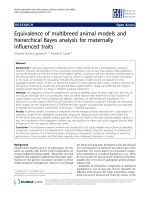
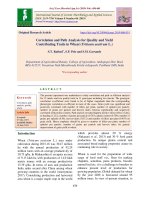
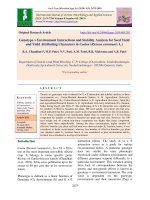



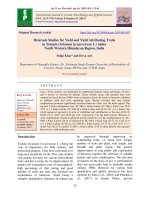

![Character association and path co-efficient analysis in F2 segregating population of Cross “Arka Kamini x PG Violet” in China Aster (Callistephus chinensis [L.] Nees)](https://media.store123doc.com/images/document/2020_01/14/medium_bzs1578961920.jpg)
